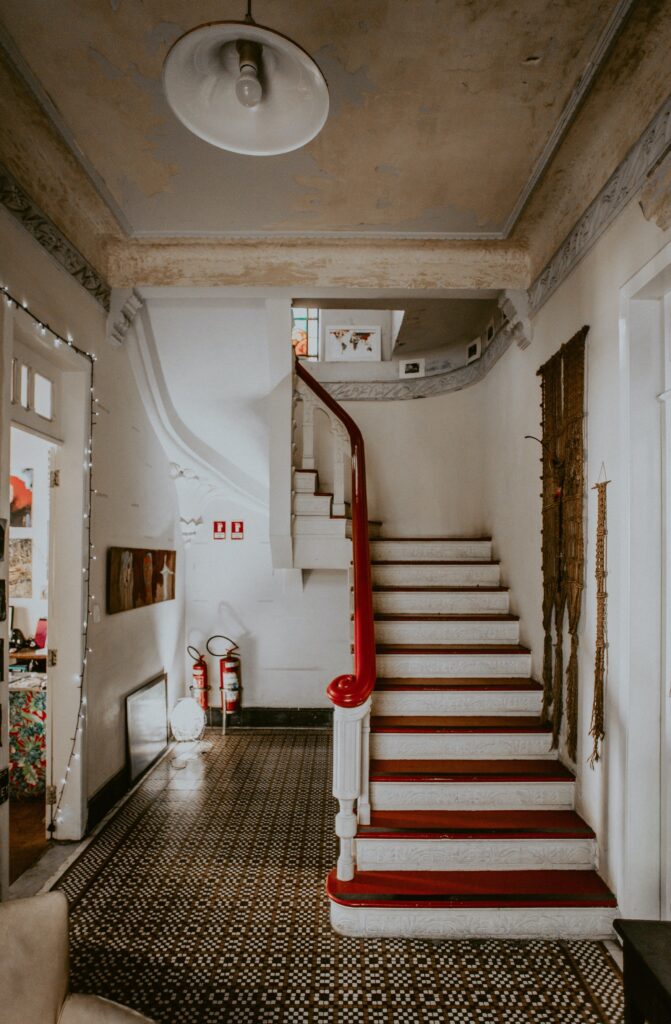
How to Rent an Apartment in France
Reading Time: 8 minutesDISCLAIMER: This post may contain affiliate links which will reward me monetarily or otherwise when you use them to make qualifying purchases. For more information, please read my privacy policy and disclaimer.
Last Updated on March 8, 2022
An Expat’s First-Hand Experience of Renting in Paris for Long-Term Housing
(by Elesha Casimir)

Elesha is one of the fellow Paris concierges with us over at Céline Concierge. We’re excited for her to write this guest blog post about her experience renting an apartment in Paris. We think that hearing from her experience, what challenges she encountered as a foreigner, and the resources she used will be invaluable to you as well.
Elesha has been in Paris for two years after receiving her Masters in Fashion and Luxury Goods Brand Management as well as working in the design and education industries.
Continue reading for Elesha’s first-hand experience and insight into Paris real estate as a renter.

Even before I moved to Paris, simply the thought of finding an apartment abroad felt daunting. I didn’t know where to begin, who to ask, where to look, what was required of me — but I quickly learned and am excited to share my experiences with you so you can avoid all the don’ts while executing all the dos.
Thankfully upon arrival, I had one friend who offered me her couch so that I was not homeless or reliant on an expensive Airbnb or shifty hostel as I searched for a long-term place to stay. The search was challenging — some days I would send my dossier to 50+ apartments with no reply. Other days I would have a breakthrough and receive a call regarding my dossier, just to be hung up on because of my broken French. But when one week of couch surfing turned into one month I began to feel concerned. What I didn’t understand is that I was missing a strong “dossier”.

E-BOOK PRE-ORDER
Get your copy of THE ULTIMATE PARIS SURVIVAL GUIDE and become an expert in All Things Parisian!
Get first dibs plus 2 FREE chapters by leaving your email here and I’ll contact you when the guide goes live.
I WANT IT!
You may be wondering what a dossier is. This is your apartment application file with several supporting documents. The required dossier documents include a photocopy of your valid ID, copies of your payslips (from the last three months) to prove your work, and proof of address for where you’re currently living (even if it’s temporary). You can likewise provide proof of residence from your previous landlord. This is to show that you are a good tenant and pay your rent on time, have some stability, and that you’re not homeless, even if you are between homes. One of the ways to show that you’re being housed by a friend or family member is by asking them to provide a letter attesting that they are housing you aka “Une Attestation d’Hébergement” along with their proof of residency (their proof of address such as an electricity bill in their name). Although it may seem informal, this letter is completely acceptable being handwritten and hand signed— no need for your friend or family member to type a formal flowery letter.
☆
Click here to get your FREE PDF
All Things Parisian
Bucket List
☆
To elaborate on the payslips, in France, you must prove that you earn 3X the amount of rent in order to rent a space. In terms of having a certain amount in your bank account, it helps to show that you have 3X or more the amount of monthly rent. This helps to instill trust in your prospective landlord. They will know that you will not have trouble paying and you will be more likely to be chosen.
You may be thinking that this process is tedious and bordering on ridiculous. But, buckle your seatbelts because that’s not all! These are only the standard required documents. In order to stand out among the crowd, you must provide supporting documents if you want to beat out the competition and secure an apartment.
Let me pause here to emphasize that a strong dossier is a huge part of the renting culture in France, especially in cities. It really highlights the fact that the French are meticulous about paperwork and they are hesitant to trust too quickly. Know that if you are experiencing barriers and a delayed timeline and seemingly endless administration paperwork, it is not abnormal, you are on the right path.
Competition is high, there are usually 10 times more renters than apartments available in metropolitan areas like in the Paris area. I do not mention this to scare you, but to prepare you to be tenacious during your hunt. Expect challenges and tackle them one after the other knowing that you will overcome them. By doing the leg work you are setting yourself apart from the average renter and are putting yourself on the path to becoming a successful renter!

Sometimes, the apartment viewing is set up with the owner or a housing agency after you’ve found an ideal place and you’ve made initial contact with them. At the apartment viewing, you can give them your physical dossier in their hands or via email. That’s why it’s valuable to have a few printed copies as well as an electronic copy saved on your cloud and even to a thumb drive so you can pop into any nearby copy shop if you need to print an extra document on a whim (the need for this often arises— trust me and be over-prepared.)
Other times, the powers that be will not waste time on apartment showings before looking at your dossier to determine if you’re a suitable candidate. When this is the case, you email them your dossier right away so that they can filter out the top potential renters.
Once you’ve given an apartment owner or housing agency your dossier, either physically or electronically, he or she will review your file and decide on the facts—what kind of job do you have? How old are you? How much money do you make? What is your renting history? This is when having a letter of recommendation from your previous landlord(s) helps differentiate you.
If the owner likes you, he or she may call you back to ask more questions, get to know you, and invite you to view the apartment in person if you haven’t already. The chances are you aren’t the only one being called back, but there are a few things you can do to further boost your chances like writing a letter of intent explaining why the owner should choose you (in French) if you can, include a nice photo of yourself in the dossier, and it doesn’t hurt to bring a small gift like chocolates or sweets just to be even more persuasive towards the owner. You never know what’s going to work in your favor, and every bit counts!
Below is a list of the typical dossier requirements PLUS what I included in my dossier to set me apart from the other candidates.
☆☆☆
REQUIRED DOSSIER DOCUMENTS:
- Photocopy of your identity card (or passport).
- Three last payslips (if you are an employee) or two last reports (if you are self-employed). If you don’t have this you need a guarantor. A guarantor is someone who will be legally responsible for the renter in case they can’t pay the rent. This could be a parent for a student or a partner who makes more income than the person being “guaranteed”. I used Garantme.fr to find a guarantor for my current apartment. The site can be viewed in English and there are anglophone representatives reachable by phone.
- Proof of address (an electricity or wifi contract bill, housing tax notice, if it’s a friend’s house, ask for this information, if it’s an Airbnb/hotel/hostel try providing your booking info with confirmation of payment and dates)
☆☆☆
TYPICAL SUPPLEMENTARY DOCUMENTS
(not required, but what most other candidates will have in their dossier)
- Pay-slips of guarantor or latest tax notice of you or your guarantors
- Student ID card, if you’re a student
- VISA and/or Residence permit (also known in French as une carte de séjour)
- Photocopy of the guarantor’s ID card
- Employer certificate – or that of the guarantor (this is to testify that you and/or your guarantor are/is employed)
- Photocopy of the property tax (or local taxes if the guarantor owns his home).
- Bank Details, or as it’s known in France as the RIB (the bank document including your IBAN and BIC bank details). (this is your bank transfer ID #)
- Rent receipts from the previous rental
☆☆☆
MY BONUS LIST
(this will make your dossier total gold)
- Resume/CV (include photo of yourself). Treat your apartment hunt like it’s a job hunt. Sharing your CV shows that you are professional and gives the person reviewing your dossier something concrete to evaluate you on.
- Cover letter (include photo of yourself). This is your opportunity to shine. Explain why you are the best candidate over someone else, speak a little bit about yourself and your goals in France. Explain why you want this apartment.
- A screenshot of the funds in your bank account or a pdf. Be sure to remove any sensitive info like account number etc.
- Letter of recommendation. Ask your previous landlord if they can write you a letter of recommendation.

Once I got my dossier in order, I began making calls and submitting my dossier to rental agencies and landlords again. Within one week of updating my dossier, I was selected for my dream apartment in the 7th (same neighborhood as the Eiffel tower)!
Let my experience serve as proof and encouragement that finding an apartment, and an apartment you love, is completely possible, even if there’s a steep learning curve throughout your process! If I could do it, I know that you can after you take what I learned and apply it to your apartment search. Remember that great apartments come and go, but all you need is just one to say yes, to call your new apartment “chez moi!”
Like a job application, you need to apply hard work, tenacity, timing, and preparedness, in order to be successful in the Parisian apartment hunt. This is not a process for the half-heartedly. It goes to show that hard work and consistency pay off, and believe me — the reward of having a space of your own in a city of wonder is worth every bit of energy.
And of course, if you’re planning to come to Paris this year, reach out to us for help finding your next Parisian dream apartment (without the headache!).
Here are some helpful apartment searching sites that you will need to take on this adventure.
☆☆☆
ELESHA’S APT REFERENCE LIST IS BELOW:
www.seloger.com
www.pap.fr
www.century21.fr
www.laforet.com
www.foncia.fr
www.fusac.fr/ad-category/housing/
www.cosyhome.net
www.leboncoin.fr (solo OR to share an apartment with a roommate)
www.appartager.com (to share an apartment with a roommate)
www.lacartedescolocs.fr (to share an apartment with a roommate)
www.roomlala.com (to share an apartment with a roommate)
www.pinql.com (to share an apartment with a roommate)
www.paris-colocations.com (to share an apartment with a roommate)
☆☆☆
FACEBOOK GROUP:
Wanted Community Paris
Intermittents Plans Logement
(this is for artists who rent their place when they are out)
PARIS: Location appartement, Colocation (longue durée)
(long-term housing)
Logement Paris: Location temporaire, Location courte durée
(short-term or temporary housing)
☆☆☆



☆☆☆
Get a Slice of Paris With This Original Paris Photography Postcards Set!








henry
Thanks for sharing this valuable blog. Having good information about Renting in Paris for Long-Term Housing
Joe
One thing not mentioned in this article is the requirement to provide the last one or two French tax assessments. These have been requested for virtually every apartment I’ve sought to rent in Nice. The problem is that there is no requirement to file a French a tax return until the year following one’s arrival in the country.
Suzanne
I enjoyed reading it and noting all of the information I will need for my relocation to Paris! Thank you for this blog post.
neststayhome
This article offers invaluable insights into the apartment rental process in France. The detailed tips on navigating local regulations and understanding lease agreements make it an essential read for anyone considering a move. I appreciate the practical advice and the focus on cultural nuances that can make a significant difference in the renting experience.